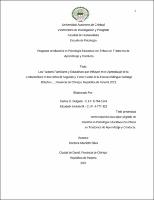Mostrar el registro sencillo del ítem
Los factores familiares y educativos que influyen en el aprendizaje de la lectoescritura en los niños de segundo y tercer grado de la escuela bilingüe Santiago Bolaños L., provincia de Chiriquí, República de Panamá 2021.
| dc.contributor.advisor | Silva, Marieth | |
| dc.contributor.author | Delgado, Karina D. | |
| dc.contributor.author | Urriola, Elizabeth | |
| dc.date.accessioned | 2022-05-06T16:41:31Z | |
| dc.date.available | 2022-05-06T16:41:31Z | |
| dc.date.issued | 2021 | |
| dc.identifier.uri | http://jadimike.unachi.ac.pa/handle/123456789/330 | |
| dc.description.abstract | This research was carried out with the purpose of determining the family and educational factors that influence the literacy learning process in children of first and second grade of Santiago Bolaños L. Bilingual School. The methodology is based on a mixed approach, with a non-experimental, cross sectional design in which 93 parents, 6 teachers between second and third grade levels and 93 students participated. The following instruments were applied as methods of data collection and analysis: a closed questionnaire addressed to parents and another one addressed to teachers; finally, a diagnostic test on reading and writing was given to students to determine their current reading and writing level. Relative to the data obtained in the questionnaire aimed at teachers, it was evidenced that they implement strategies for teaching and learning both reading and writing; in other hand, according to the results of parents, it was observed that there is a higher percentage on nuclear and extended families (big families) with a predominance of democratic parenting style. Finally, the diagnostic test on reading and writing used with the students revealed that they are generally at an adequate level, but they need to be reinforce through greater stimulation in both processes. This research has also fulfilled the objective of creating a psychoeducational manual, providing to Santiago Bolaños L. Bilingual School with its future implementation, which will contribute to the promotion of literacy activities. | es_ES |
| dc.description.abstract | El presente estudio investigativo se ha llevado a cabo con la finalidad de determinar los factores familiares y educativos que influyen en el aprendizaje de la lectoescritura en niños de segundo y tercer grado de la escuela Bilingüe Santiago Bolaños L. La metodología se sustenta en un enfoque Mixto, con un diseño no experimental, de tipo transversal en la cual participaron 93 padres de familia, 6 docentes de segundo y tercer grado y 93 estudiantes. Se aplicaron los siguientes instrumentos como métodos de recolección y análisis de datos: cuestionario cerrado, dirigido a los padres de familia y otro dirigido a los docentes; por último, se realizó una prueba diagnóstica sobre lectura y escritura a los estudiantes para conocer el nivel actual de lectoescritura que presentan. Con relación a los datos obtenidos en el cuestionario dirigido a docentes se evidenció que estos ejecutan estrategias para la enseñanza y aprendizaje tanto de lectura como de escritura; de acuerdo con los resultados de padres de familia se observa que hay un mayor porcentaje en el tipo de familia nuclear y extensa con predominio de estilo de crianza democrática. Finalmente, la prueba diagnóstica sobre lectura y escritura empleada a los estudiantes permitió conocer que se encuentran de manera general en un adecuado nivel, pero que deben fortalecerse a través de mayor estimulación en ambos procesos. Esta investigación también ha cumplido con el objetivo de realizar un manual psicoeducativo, brindándole a la escuela Bilingüe Santiago Bolaños L. su futura implementación que contribuirá con el fomento de actividades en lectoescritura. | |
| dc.language.iso | es | es_ES |
| dc.publisher | Universidad Autónoma de Chiriquí. | es_ES |
| dc.title | Los factores familiares y educativos que influyen en el aprendizaje de la lectoescritura en los niños de segundo y tercer grado de la escuela bilingüe Santiago Bolaños L., provincia de Chiriquí, República de Panamá 2021. | es_ES |
| dc.type | Thesis | es_ES |
Ficheros en el ítem
Este ítem aparece en la(s) siguiente(s) colección(ones)
-
Maestría en Psicología Educativa [13]
Tesis de Maestría en Psicología Educativa

